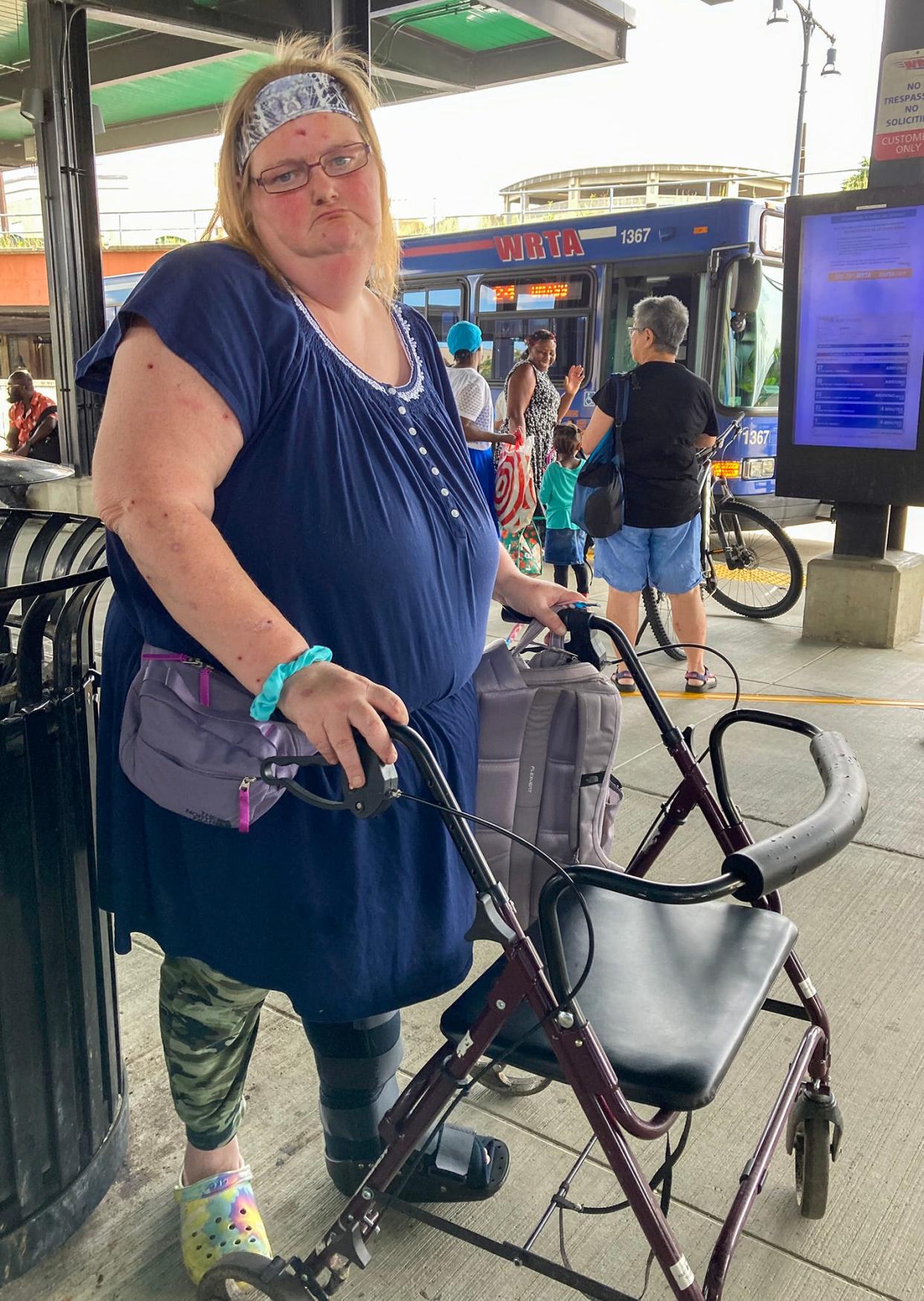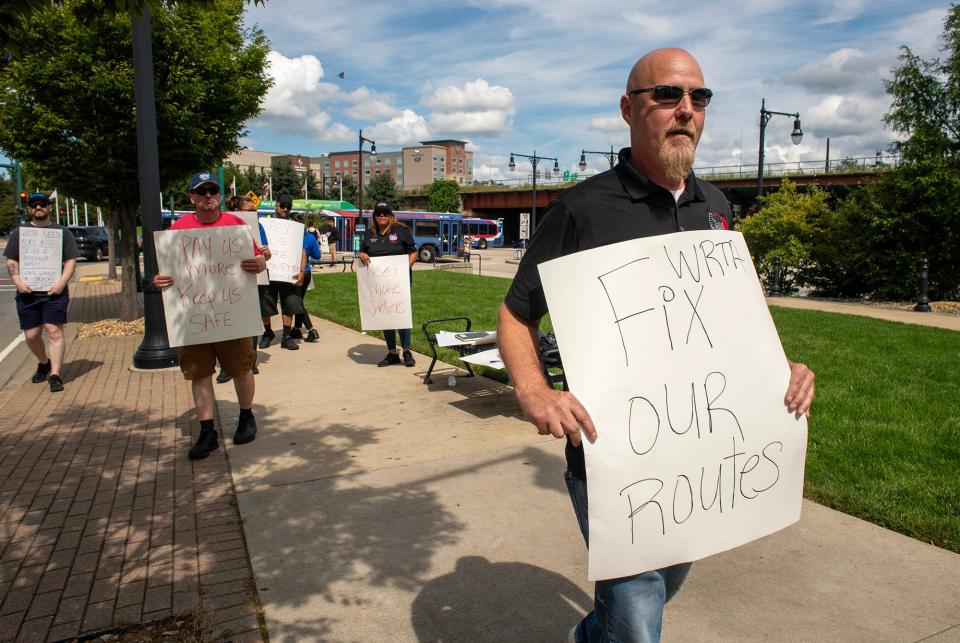Worcester bus drivers and passengers are angry. Here's why

WORCESTER — Nadine Paige was angry.
The Worcester resident has a cast on her left foot after surgery and relies on buses to get around the city. But the bus she needed – Route 24 – was out of service, with no driver in sight.
“I’ve been waiting a long time,” said the 41-year-old Paige Monday as she stood near the inactive Route 24 bus at the Worcester Regional Transit Authority’s terminal downtown, balancing herself on a walker. “There was supposed to be a driver filling in. There aren’t enough drivers.”
Paige eventually hopped on another bus, but her claim of not enough drivers was the rallying cry for Amalgamated Transit Union Local 22, as members of the bus drivers union picketed outside the WRTA’s headquarters yards away from where Paige’s frustration bubbled over.
Union: Passenger anger means bus driver safety is an issue
“It's like a ticking time bomb,” said Ken Kephart, the union’s business agent with 34 years of service at the WRTA, as he held a handmade sign during the picket that said, “WRTA, Fix Our Routes.”
What Kephart meant is the union’s belief that passengers are angry because there aren't enough drivers to cover for those who take family and medical leave, plus those off the job due to workers' compensation. In January, the WRTA cut 112 one-way trips on more than a half-dozen routes Fridays because of a lack of drivers primarily due to the Paid Family Medical Leave Act.
The union agreed to the route cuts, said Kephart, but when a driver is out, especially on Fridays, there isn't another to pick up the slack. It's a situation that has created inefficiencies and passenger anger, according to Kephart, because some routes are packed with riders, meaning some can't get a seat on a bus, while other routes have empty buses.
Meanwhile, free bus fares instituted by the WRTA board during the pandemic and subsequently extended to June created a big increase in the number of riders with not enough drivers to cover demand, said Kephart.
"Passengers are frustrated and they're taking it out on drivers," said Kephart.
To fix the driver shortage, the union wants the WRTA to hire 10 to 12 additional drivers. More drivers means more buses on the roads and that leads to happier passengers, the union believes.
If each additional driver is full-time, then the price tag would run the WRTA $80,000 to $100,000 in salary and benefits per driver, said Kephart. He believes the money is "just sitting there," because the WRTA has $20 million in federal pandemic relief funds from the Coronavirus Aid, Relief and Economic Security Act, also known as the CARES Act.

New WRTA leader: Time to study the numbers
Seated in a conference room in the WRTA's headquarters building on Foster Street, with a clear view of the picket three floors below, WRTA administrator Joshua Rickman said he needed time to study the authority’s books to determine if Kephart’s analysis of the cost of each driver and $20 million in CARES money is accurate.
Rickman's first day on the job was just over a week ago Aug. 21. He arrived from Connecticut Transit and said he appreciates the union’s concerns, has an open-door policy and is starting to meet with neighborhood groups to understand what residents want in terms of public bus service.
"It’s important to me,” said Rickman of the union’s demand, adding he needs more time to understand the WRTA’s financial landscape before “informed decisions” are made.
Steps are underway to alleviate the union’s concerns, said Rickman, including a new WRTA website to make it easier for potential drivers to submit applications.
He also said an internal “analysis” needs to occur to get a full understanding of the safety concerns that the union feels its drivers face. That analysis could take a month, said Rickman, followed by three months to train new drivers – if more are hired – before they’re ready to cover routes.
“I am very excited to be here at the WRTA,” said Rickman, who noted the authority's fixed route operating budget including salaries for bus drivers, is $24.5 million in fiscal 2024, with much of it coming from the state. “I think there's a tremendous opportunity here to improve services.”
Rickman added it's his understanding that state lawmakers are discussing increased aid to regional transit authorities and if the funds come through, then more drivers could be hired.
'Denied, denied, denied'
Kephart said the union’s demand for more drivers has been expressed to management multiple times, with “denied, denied, denied” the result. A strike isn’t planned if the union's demands aren't met, said Kephart, because the union and management have a three-year contract in place that runs through August 2025.
More pickets and lobbying of local lawmakers are the union’s strategy to keep pressure on WRTA management until more drivers are added to the payroll, according to Kephart.
Rider advocates joined Monday’s picket and Adam Theilker, with the Riders Action Council in Worcester, was one of them. He said the WRTA is a “victim of its own success" because the free fares since the pandemic mean there aren't enough drivers to cover skyrocketing passenger demand.
“(WRTA) management is satisfied with the way things are going. It shouldn’t be. This is a mess,” said Theilker.
Kephart noted CARES Act funds cover the free fares that total up to $3 million annually. Earlier this month, Gov. Maura Healey signed the $56 billion fiscal 2024 state budget that includes $15 million for fare-free pilot programs at regional transit authorities.
One rider's perspective: People are upset
Rose Cleveland supports Theilker's assessment that the lack of riders is a mess. The 34-year-old Worcester resident takes WRTA buses every day, and while she waited at the authority's downtown terminal Monday, Cleveland said the lack of drivers is “really bad.”
"There aren't enough drivers. Buses are being cancelled and people are getting really upset. We need reliable drivers," she said.
Contact Henry Schwan at henry.schwan@telegram.com. Follow him on X: @henrytelegram.
This article originally appeared on Telegram & Gazette: WRTA bus drivers and riders protest and call for more hiring

